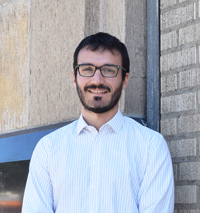
Fulbright-Jose Siderman Human Rights Fellowship for Argentine Lawyers
In an effort to promote the training of young Argentine lawyers in civil liberties and human rights, the family of Jose Siderman and the Fulbright Commission in Argentina have established the Jose Siderman-Fulbright Human Rights Fellowship at Southwestern. The Fellowship brings an Argentine law graduate to Los Angeles to complete an LL.M. degree in Civil Liberties and Human Rights or Advocacy at the law school, including an externship with a civil rights organization. The program complements the association Southwestern has maintained for many years with Argentina through summer programs, judicial externships and exchange programs in Buenos Aires.
The Fellowship is named for Jose Siderman, a successful businessman who was a victim of Argentina's "dirty war" and suffered kidnapping, torture and exile during the 1970's and 80's at the hands of that country's military dictatorship. In a landmark human rights case heard in federal court in Los Angeles in 1996, the government of Argentina agreed to settle damage claims by Mr. Siderman and his family after a 14-year legal battle led by the American Civil Liberties Union. Mr. Siderman's family felt a fellowship in human rights law would be a fitting tribute to him and would contribute to the future protection of human rights in Argentina.
The Fulbright Commission in Argentina will select one Siderman Fellowship recipient per year as part of its regular grant competition. The program involves nine months of study at Southwestern and a three-month externship. Applicants must be law graduates from an accredited Argentine law school and will be selected on the basis of their academic ability, English language fluency and potential for furthering human rights and social justice in Argentina. The fellowship provides funds for living expenses, books, health insurance, and round-trip airfare from Argentina.
Siderman Fellowship Program Overview
- The Fellowship recipient will be selected by the Fulbright Commission in Argentina. There will be one fellowship per year.
- Fellowship applicants must be law graduates from an accredited Argentine law school and will be selected on the basis of their academic ability, English language fluency, and likely future contribution to human rights and social justice in Argentina. Once selected by Fulbright, Fellowship recipients will also be required to complete all requirements for admission to the Southwestern LLM program. Absent exceptional circumstances, all Fellowship recipients will be expected to have received a score of 600 or better on the paper-based TOEFL examination or an equivalent score on any of the TOEFL's other formats.
- Funding will be provided for a twelve-month stay in the United States that will involve nine months of study at Southwestern and a three-month externship at a U.S. civil liberties or public interest law organization.
- Studies at Southwestern will be toward an LLM in Civil Liberties and Human Rights, unless the Fellowship recipient has a strong criminal law orientation that makes an LLM in Advocacy more appropriate. Southwestern awards an LLM degree on the basis of 26 units of credit, and students will be permitted to take up to 15 units of classes each semester at Southwestern.
- The three-month externship at a civil liberties or public interest law organization will focus on legal skills as well as on organization building skills, including NGO management, fundraising, relationships between staff and membership, use of volunteers and community outreach. In some cases, students may begin their work at the organization during the regular semester as part of their legal skills development and continue their work during the summer with a focus primarily on organization-building skills.
- Fellowship recipients will receive free tuition at Southwestern and a monthly living-expense stipend for twelve months.
- The Fulbright Commission will pay for the Fellowship recipient's air travel between Argentina and Los Angeles and it will provide the same Health Insurance it gives to all the Fulbright grantees. Fulbright will handle all visa requirements, with Fellowship recipients traveling to the United States on a J-1 visa that will obligate them to return to Argentina for at least two years upon completion of their training.
- The administration of the program will be carried out in adherence with the Policies of the J. William Fulbright Foreign Scholarship Board, and the Fulbright Board will make final selection of all grantees.
Read More About Past Siderman Fellows
- Ezequiel Strajman (2021-2022)
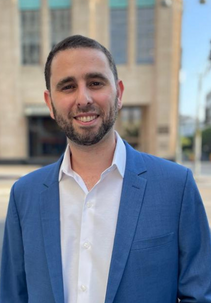 Ezequiel Strajman has been working in the field of Criminal Law and Human Rights in Argentina since 2012 when he joined a program against police and penitentiary officials' abuse in the Province of Buenos Aires. After taking his law degree at the University of Buenos Aires in 2013, he worked for two years in the Center for Legal and Social Studies (CELS), a well-known Argentinean Human Rights NGO. There, he supported the team of lawyers that represented the victims of the repression of the mass public demonstrations that took place in Buenos Aires in December of 2001. Later, he joined the Ministry of Justice and Human Rights of Argentina as senior advisor and trial attorney in the Jewish Mutual Association (AMIA) cover-up case, related to the terrorist attack against a Jewish community center in 1994. For the last years, Strajman has been working with the Ministry as part of the National Directorate of Access to Justice, developing training programs for public officials, and collaborating with the National Human Rights Secretariat in matters related to the investigation of institutional violence and compliance with Inter-American Human Rights standards.
Ezequiel Strajman has been working in the field of Criminal Law and Human Rights in Argentina since 2012 when he joined a program against police and penitentiary officials' abuse in the Province of Buenos Aires. After taking his law degree at the University of Buenos Aires in 2013, he worked for two years in the Center for Legal and Social Studies (CELS), a well-known Argentinean Human Rights NGO. There, he supported the team of lawyers that represented the victims of the repression of the mass public demonstrations that took place in Buenos Aires in December of 2001. Later, he joined the Ministry of Justice and Human Rights of Argentina as senior advisor and trial attorney in the Jewish Mutual Association (AMIA) cover-up case, related to the terrorist attack against a Jewish community center in 1994. For the last years, Strajman has been working with the Ministry as part of the National Directorate of Access to Justice, developing training programs for public officials, and collaborating with the National Human Rights Secretariat in matters related to the investigation of institutional violence and compliance with Inter-American Human Rights standards.“Fighting the impunity of human rights violations requires lawyers with a sound theoretical and practical education, and this is one of the foremost reasons I applied for the Fulbright-Jose Siderman Human Rights fellowship. I knew about the inspiring work that the past Siderman fellows are doing to advance human rights, and the deep impact this experience had on their careers.”
During his first semester at Southwestern Law School, Ezequiel gained insights into the foundations of the American legal system. “I really enjoyed Constitutional Law with Professor Carrasco, Constitutional Criminal Procedure with Professor VanLandingham, and Evidence with Professor Cammak”, he expresses. “Professor Jonathan Miller and his Seminar on International Human Rights were fundamental to me not only for the enriching discussions on human rights issues, but also to learn the basic structure of the American legal academic writing. These are skills I expect to apply this spring semester, for example during the seminar on Sex Crimes with Professor Carpenter, and for the rest of my professional life”, he adds.
Furthermore, Strajman is confident that the LLM will bolster his capacities as a litigator and advisor on Criminal Law and Human Rights. “Argentina is implementing a new Federal Criminal Code of Procedure which finally adopts an adversarial system. Even though trials by jury are currently taking place only in some provinces, they are expected to have a greater presence in the country in the future. Therefore, I was so thrilled to take Trial Advocacy with Prof. Mavis, putting in practice what I have learned so far, and I am also looking forward to my summer internship at the American Civil Liberties Union”, he affirms.
Above all, Strajman considers the Fulbright-Jose Siderman fellowship a life-altering experience. “I had the possibility to move with my wife to Los Angeles for a year and to enjoy from this diverse city while pursuing this challenging academic program, which will strengthen my work in Argentina. I am very grateful to all Southwestern faculty, which have made me feel welcomed and comfortable, and very specially to the Siderman family and the Fulbright Commission for making this possible”.
- Ayrton Zazo Girod (2020-2021)
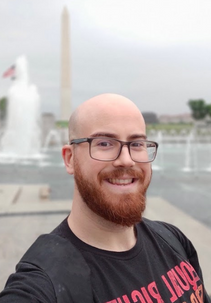 Ayrton earned his law degree from the Universidad de San Andrés with a full scholarship. Post-graduation, Ayrton started to work in the Ministry of Culture of Argentina. That same year, he also participated in a Human Rights Workshop hosted by the World Federation of United Nations Associations, representing the Argentinian chapter (UNA-AR). Ayrton volunteered to edit a Foreign Affairs journal and collaborated in the Model United Nations conferences in the European Headquarters of the United Nations in Geneva, Switzerland. He worked for a short time in the Ministry of Justice, assisting in a project about facilitating access to justice funded by the UNDP. After that experience, he worked for three years at the Secretariat of Provinces of the Ministry of Interior of Argentina. In 2020, he was granted the Siderman-Fulbright Scholarship.
Ayrton earned his law degree from the Universidad de San Andrés with a full scholarship. Post-graduation, Ayrton started to work in the Ministry of Culture of Argentina. That same year, he also participated in a Human Rights Workshop hosted by the World Federation of United Nations Associations, representing the Argentinian chapter (UNA-AR). Ayrton volunteered to edit a Foreign Affairs journal and collaborated in the Model United Nations conferences in the European Headquarters of the United Nations in Geneva, Switzerland. He worked for a short time in the Ministry of Justice, assisting in a project about facilitating access to justice funded by the UNDP. After that experience, he worked for three years at the Secretariat of Provinces of the Ministry of Interior of Argentina. In 2020, he was granted the Siderman-Fulbright Scholarship. At Southwestern, he participated in Law Review and in the Immigration Law Clinic, which was one of the most fulfilling and educative experiences he ever had.
- Victoria Santesteban (2019-2020)
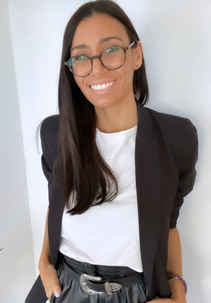 Victoria Santesteban is an Argentinian lawyer, specializing in Humans Rights and Gender Issues. As a feminist and a human rights activist, she currently works as a legal assistant for victims of gender-based violence at the Judiciary of La Pampa, Argentina. Victoria has also started a career in writing. Since 2020, she has been publishing weekly articles on Women's Rights in La Arena, a local newspaper.
Victoria Santesteban is an Argentinian lawyer, specializing in Humans Rights and Gender Issues. As a feminist and a human rights activist, she currently works as a legal assistant for victims of gender-based violence at the Judiciary of La Pampa, Argentina. Victoria has also started a career in writing. Since 2020, she has been publishing weekly articles on Women's Rights in La Arena, a local newspaper. - Andrea Noguera (2018-2019)
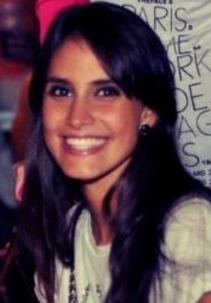 Andrea Noguera completed her law degree from the Faculty of Law and Social Sciences of the National University of Tucumán and earned a degree in International Defense of Human Rights from the Universidad de Zaragoza. She was awarded the José Siderman - Fulbright Human Rights Fellowship in 2017-2018 and completed her LLM in Human Rights and Civil Liberties at Southwestern Law School.
Andrea Noguera completed her law degree from the Faculty of Law and Social Sciences of the National University of Tucumán and earned a degree in International Defense of Human Rights from the Universidad de Zaragoza. She was awarded the José Siderman - Fulbright Human Rights Fellowship in 2017-2018 and completed her LLM in Human Rights and Civil Liberties at Southwestern Law School. - Sabrina Frydman (2017-2018)
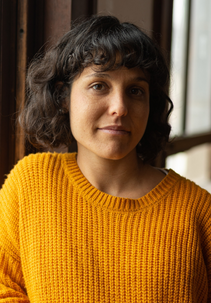 Sabrina Frydman holds a Law Degree with a specialization in Public International Law from the University of Buenos Aires, and an LLM in Human Rights and Civil Liberties from Southwestern Law School, as a result of being awarded the José Siderman - Fulbright Human Rights Fellowship (2017-2018). She is a human rights activist and educator and currently works as the head of the General Secretariat for the Matanza Riachuelo Basin Authority (ACUMAR).
Sabrina Frydman holds a Law Degree with a specialization in Public International Law from the University of Buenos Aires, and an LLM in Human Rights and Civil Liberties from Southwestern Law School, as a result of being awarded the José Siderman - Fulbright Human Rights Fellowship (2017-2018). She is a human rights activist and educator and currently works as the head of the General Secretariat for the Matanza Riachuelo Basin Authority (ACUMAR). - Gaspar Lopez (2016-2017)
Gaspar Lopez, the 2016-2017 Jose Siderman-Fulbright Human Rights Fellow at Southwestern, became interested in human rights and constitutional studies before he completed law school at the National University of Tucumán Law School.
After he graduated, he spent a year working for the federal prosecutor’s office, in charge of the investigations of the crimes committed by the last military dictatorship in his province. Then he left Tucumán to join Brazil's Office of the Center for Justice and International Law, where he deepened his knowledge in the economic, social, and cultural rights field. Back in Argentina, he began working as a legal advisor in the public health sector. First, he did it at a Federal level (in Buenos Aires city), and since 2012 he has been working for the Public Health Ministry in Tucumán. Additionally, he teaches at the National University of Tucumán Social Work School.
“It was a decisive moment in my career to start working for ANDHES, an organization that serves the northwest region of Argentina, and it was meaningful because it provided me with a different approach to law. I got to view human rights work there from a social perspective.”
Lopez is most interested in social aspects of Human Rights, especially regarding issues related to poverty and social inequality. He points out that “Tucumán is situated in one of the most neglected regions of the country, a context that has boosted my conviction about the need to generate changes pursuing a more inclusive and democratic society.”
Seeking an opportunity to strengthen his theoretical knowledge and skills and gain a new perspective while earning a Master of Laws (LL.M.) degree, Lopez said that the Siderman Fellowship was the perfect opportunity for him. “I read a lot about how proud Southwestern is of its diversity of environment and students, and I really agree with that,” he said. “There are people from all over the world around campus and in my classes. I think that’s really great.”
Lopez likes all of his classes at Southwestern, which include Constitutional Law with Professor Jonathan Miller, Evidence with Professor Isabelle Gunning, Public International Law with Professor Robert Lutz, and Children and the Law with Professor Amy Pellman. In fact, he enjoyed Judge Pellman’s class so much that next semester, he will be an extern at the Edmund D. Edelman Children's Court where she presides. Before he returns to Argentina at the end of the summer, Lopez will also complete an externship at the ACLU.
“Our legal culture is completely different in Argentina,” Lopez said. “It is interesting for me to understand how the system here works in the protection of fundamental rights. It’s providing me with a different perspective of how things could work in Argentina, and makes me realize some things we could do in other ways. It also helps me think about my personal approach to the law and to perceive it in a different way.”
- Agustin Cavana (2015-2016)
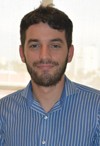 In Argentina, Cavana worked for the National Penitentiary Procuration, which is responsible for protecting the human rights of federal prisoners. He also teaches human rights at the University of Buenos Aires and is an adjunct professor in a master’s program at a school for state advocates and lawyers.
In Argentina, Cavana worked for the National Penitentiary Procuration, which is responsible for protecting the human rights of federal prisoners. He also teaches human rights at the University of Buenos Aires and is an adjunct professor in a master’s program at a school for state advocates and lawyers.In addition to prison law, Cavana also has an interest in transitional justice — the area of the law that deals with the problems of restoring democracy after armed conflict.
“It is interesting to think that people who live near you are deprived of their liberty and co-exist in this different environment where everyday rules don’t apply.”
“In Argentina we had a military dictatorship from 1976 to 1983, and we had difficulties to hold the dictatorship accountable for killings and disappearances committed during that time and we are still struggling to deal with their civilian and economic accomplices,” he said. “I became interested in the topic and became familiar with the Siderman case, which addressed those issues and complexities. It was an unprecedented case because an Argentinian received compensation from an international court.”
Cavana is also interested in the American criminal justice system and hopes to gain a better understanding of how American lawyers and scholars address certain issues as well as a grasp on how legal and government institutions work in the United States.
“We have a different legal culture in Argentina,” he said. “I hope to learn about things that would make me able to contribute to ongoing suggestions about how to change it.
Since Siderman fellows began to study at Southwestern seven years ago, there have been some changes in Argentina. Buenos Aires Province is just starting to conduct jury trials. “There are a lot of questions and issues we need to address until we have a fully functional jury system,” Cavana said. “Since we always dealt with professional judges, Argentine lawyers weren’t concerned with sifting through the evidence for the fact finder because judges went to law school and could properly assess what’s prejudicial. So we should at least consider having rules of evidence now that we are moving into jury trials.”
At Southwestern, Cavana is currently taking courses in Prison Law and Mass Incarceration with Professor Scott Johnson, Evidence with Professor Mark Cammack, Constitutional Law with Professor Jonathan Miller, National Security Law with Professor Rachel VanLandingham and White Collar Crime with Professor Kelly Strader.
“I’m really enjoying Constitutional Law,” he said. “Learning about how it is in the United States really made me think about issues from a totally different perspective. Learning about how law and procedure works in another country makes you learn even more about your own country.”
Cavana has also enjoyed getting to know American students and finds learning how they think about certain issues inspirational. “It can help you realize how you’ve been thinking about a particular issue in a certain way without thinking about the potential problems and implications in that,” he said. “It gives you new tools to rethink all of those problems, but from a different, richer perspective.”
For Cavana, this experience has also marked his first time in the United States. He is impressed by the diversity in Los Angeles and is grateful for the opportunity to meet people from different cultures, backgrounds and religions. He added, “Despite all the problems you hear about, Americans are very open and conscious about it. There’s a lot of effort to make everyone feel comfortable and included.”
To promote human rights in Argentina, the family of José Siderman, the Fulbright Commission in Argentina and Southwestern Law School established a fellowship at Southwestern for an individual selected by the Fulbright Commission through a nationwide competition to spend one year in Los Angeles specializing in human rights. The Fellow, who has typically graduated from law school in the past four to eight years, and who must have a background working in human rights in Argentina, spends two semesters at Southwestern studying for an LL.M. degree in either Civil Liberties and Human Rights or in Advocacy, and follows the time at Southwestern with a summer spent working at the ACLU of Southern California. The fellowship complements the association Southwestern has maintained for many years with Argentina through summer programs, judicial externships and exchange programs in Buenos Aires.
- Federico Efron (2014-2015)
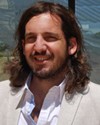 After earning his law degree from the University of Buenos Aires, Efron obtained an advanced degree in Criminal Law from Torcuato Di Tella University. In Argentina, Efron was a Senior Lawyer for the “Institutional Violence y Urban Security” program at the Center for Legal and Social Studies, a position he will resume when he returns home. There, he works to make sure that law enforcement agencies adhere to human rights standards. This includes representing victims or relatives of victims in criminal proceedings that concern police abuse. His job also focuses on working to change policy and how law enforcement agencies work in Argentina.
After earning his law degree from the University of Buenos Aires, Efron obtained an advanced degree in Criminal Law from Torcuato Di Tella University. In Argentina, Efron was a Senior Lawyer for the “Institutional Violence y Urban Security” program at the Center for Legal and Social Studies, a position he will resume when he returns home. There, he works to make sure that law enforcement agencies adhere to human rights standards. This includes representing victims or relatives of victims in criminal proceedings that concern police abuse. His job also focuses on working to change policy and how law enforcement agencies work in Argentina.“In terms of actual statistics, there may be not a lot of police abuse, but it’s a structural problem. Abuses seem to always be against the poor, the immigrants, the most forgotten citizens of our society. In addition to the iniquities of being poor, they also get the worst possible treatment by police.”
In 2008, Efron founded with some colleagues the Legal Support Group of Ciudad Oculta (GAJCO) office. This group provides free legal assistance for citizens living in shanty towns near Buenos Aires. These settlements, with populations of 2,000 to 20,000 live without water and electricity.
“For a few hours every Saturday, Argentine lawyers volunteer their time,” he explained. “I had been busy and was not able to go as often before I left for the U.S., but the things I’m learning here and my work with Southwestern’s Immigration Law Clinic this semester makes me want to start doing more of it when I return.”
For Efron, being a Siderman Fellow has been a professionally and personally enriching experience. “I have enjoyed all of my classes,” he said. “Constitutional and Criminal Procedure with Professor Cammack was very good because it was really interesting to learn about all the case law here, especially because I work with that in Argentina. Constitutional Law with Professor Miller broadened my way of thinking about the legal issues that I approach every day.”
Efron is also currently taking Complex Criminal Litigation with Professor VanLandingham, and Forensic Evidence with Professors Doughy and Weiner. Additionally, he is working on an Independent Study with Vice Dean Carpenter where he is researching the role of the victim in the criminal system in Argentina and how it can be applied to American system. Before returning to Argentina, he will extern with the American Civil Liberties Union.
“The LL.M. experience at Southwestern has been amazing,” Efron said. “I’m really grateful and happy about it, especially because I have always worked while I’ve been in school, and this opportunity allows me to solely focus on studying for first time in my life.”
To promote human rights in Argentina, the family of José Siderman, the Fulbright Commission in Argentina and Southwestern Law School have established a fellowship at Southwestern for an individual selected by the Fulbright Commission through a nationwide competition to spend one year in Los Angeles specializing in human rights. The Fellow, who has typically graduated from law school in the past four to eight years, and who must have a background working in human rights in Argentina, spends two semesters at Southwestern studying for an LL.M. degree in either Civil Liberties and Human Rights or in Advocacy, and follows the time at Southwestern with a summer spent working at the ACLU of Southern California. The fellowship complements the association Southwestern has maintained for many years with Argentina through summer programs, judicial externships and exchange programs in Buenos Aires.
- Mariano Gaitan (2013-2014)
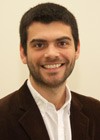 As a Jose Siderman-Fulbright Human Rights Fellow pursuing his LL.M. degree, Mariano Gaitan has been enjoying his education at Southwestern. During the Fall semester, he took courses in Evidence with Professor Mark Cammack, as well as Constitutional Law and a seminar on International Protection of Human Rights with Professor Jonathan Miller. Because Gaitan practices criminal law in his native Argentina, he found Criminal Procedure with Professor Jessica Berch to be especially beneficial.
As a Jose Siderman-Fulbright Human Rights Fellow pursuing his LL.M. degree, Mariano Gaitan has been enjoying his education at Southwestern. During the Fall semester, he took courses in Evidence with Professor Mark Cammack, as well as Constitutional Law and a seminar on International Protection of Human Rights with Professor Jonathan Miller. Because Gaitan practices criminal law in his native Argentina, he found Criminal Procedure with Professor Jessica Berch to be especially beneficial.Before graduating from the University of Buenos Aires Law School in 2008, Gaitan began working as a paralegal for the Association of Grandmothers of Plaza de Mayo (Abuelas de Plaza de Mayo). Since completing school, he has been a staff attorney with this human rights organization. His main responsibilities include litigation of cases concerning massive violations of human rights committed in Argentina during the 1976-1983 military dictatorship.
Gaitan has found it most fascinating to learn about the differences between the ways criminal law is practiced in the United States verses his home country. "In Argentina, we have an inquisitorial system. Trials are mainly written and secret," he said. "We practically don't have hearings. All investigation is up to the judge. It's very bureaucratic, very inefficient and many times, it violates the rights of the involved parties. However, in Argentina there is movement to reform the criminal justice system."
This semester Gaitan is working in an externship at the LA County District Attorney's Office in the Justice System Integrity Division in downtown Los Angeles. This special unit deals with all the cases involving members of the justice system, including lawyers, judges and police. In this work, he is finding that matters concerning the potential wrongdoing of law enforcement are very connected with the kinds of cases he works on in Argentina.
"I think that maybe the most interesting is having the opportunity to see how the adversarial system works on a daily basis. My externship is showing me about this."
Gaitan spends up to three days each week at the D.A.'s office and attends as many hearings as he can. "In Argentina, we are trying to reform our system in a way that might resemble the U.S. adversarial system more," he said. "Going to court regularly gives me advanced insight into the U.S. system."
Currently, he is taking Constitutional Law II with Professor Gowri Ramachandran, Trial Advocacy with Professor Deborah Brazil and History of American Law with Professor Arthur McEvoy. At the conclusion of the Spring semester, he will extern with the ACLU.
"I really like Southwestern," he said. "The faculty has been so great to me. I feel like I had some language issues when I started, and they were very kind and helpful. This school has this atmosphere where everyone is close to you and trying to help you feel comfortable and to do your best."
Gaitan admits that this experience was a bit lonely at first. After all, this Fellowship was his first time traveling to the United States and his girlfriend is currently studying on the East Coast. The thing that made the transition convenient and comfortable was the opportunity to live in The Residences at 7th, Southwestern's new on-campus housing complex. "The facilities are great," he said. "It's a privilege to be in the heart of the city. I don't have to spend any time commuting or worrying about driving."
Southwestern helped Gaitan meet new friends by organizing some activities for other international LL.M. students on campus. But more than anything, he has relished the chance to devote a whole year to concentrate completely on learning about the U.S. legal system. "In Argentina, it's common to work and study at the same time, and it's very hard," he said. "While I'm here, I can focus on my studies and get the most out of it."
- Celina Giraudy and Ezequiel Gutierrez (2012-2013)
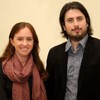 Argentine lawyers Celina Giraudy and Ezequiel Gutierrez de la Carcova have devoted their careers to helping those who have been disenfranchised.
Argentine lawyers Celina Giraudy and Ezequiel Gutierrez de la Carcova have devoted their careers to helping those who have been disenfranchised.In Argentina, Giraudy worked as a human rights attorney for the Center for Justice and International Law (CEJIL) and the Asociación Civil por la Igualdad y la Justicia (ACIJ), and served as a professor at the University of Palermo. Gutierrez also served on the Palermo faculty as a professor of the Public Interest Law Clinic, as well as for the Human Rights Clinic of ACIJ/University of Buenos Aires. In addition, Gutierrez has served as an Assistant of the District Attorney in Buenos Aires.
During their first semester at Southwestern, Giraudy and Gutierrez took courses in Legal Writing for LL.M., Constitutional Law, Constitutional Criminal Procedure and Interviewing, Counseling and Negotiation. Additionally, Giraudy enjoyed the Women in the Law Seminar taught by Professors Judy Sloan and Alexandra D'Italia. "All of the courses are really interesting," Giraudy said. "The seminar for me is especially interesting. It's not like a lecture. We have the opportunity to discuss more deeply women's issues and discrimination."
Gutierrez appreciated the Youth at Risk Seminar taught by Professor Myrna Raeder and Professor Karen Smith's Constitutional Criminal Procedure course. "I like the case method of teaching the law here," he said. "It's a good way of studying law, and the fact patterns are helpful. In Argentina, it's more of a lecture structure and learning what the law says in the abstract."
Part of Gutierrez' work in Argentina is to coordinate student clinics that take on class action cases to fight for social justice. The matters typically involve issues of discrimination related to sexual orientation, minorities and people with disabilities. He also advocates on behalf of those who struggle for basic needs such as access to clean water.
Both Giraudy and Gutierrez, who met during their professorial work, teach courses in human rights issues, legal writing and legal practice for first-year students. "But we always try to relate all of our courses to human rights issues because that's our area of expertise," Gutierrez said.
During the Spring semester, Giraudy is participating in the Street Law Clinic while Gutierrez works in the Immigration Law Clinic. They are excited to learn about how clinics are structured here. "The clinical programs we teach in Argentina are basically an export from the U.S., so it's going to be very interesting to see [first-hand] how they are taught here," Gutierrez said.
At the end of the academic year at Southwestern, both will extern for the ACLU for three months before returning to Argentina. "That's what made the scholarship even more appealing to us," Giraudy said.
"We are excited to gain experience in both the theoretical and practical aspects of being a human rights attorney."
They both have enjoyed learning about the jury system in the United States, especially for criminal cases, which stands in contrast to the oral trials held before three judges in Argentina.
Both look forward to bringing the knowledge they acquire at Southwestern to their native country when they return in August. For now, they are enjoying all that Southwestern and Los Angeles have to offer. "Everyone at Southwestern is extremely kind and supportive and understanding of our language boundaries," Giraudy said. "We're having a wonderful experience."
- Juan Mondelli (2011-2012)
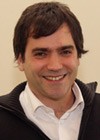
Juan Mondelli, the 2011-2012 Siderman Fellow, specializes in immigration and asylum law. Since 2003, Juan has worked for the United Nations High Commissioner for Refugees (UNHCR) as a protection officer and legal advisor on issues related to refugee protection. His main responsibilities entail supporting national governments and non-governmental organizations that assist refugees in their local integration process in the asylum country. He regularly participates in proceedings of Argentina's National Refugee Commission, which adjudicates asylum claims, and conducts training and workshops for government officials. He also provides support to international workshops dealing with refugee protection. In 2009, he taught the UNHCR's course on International Refugee Law in San Remo, Italy.
"Because of my experience working for the U.N., I know a lot about refugee and human rights law, but studying the U.S. system for immigration and asylum is important because it is so developed. In Argentina, we have many human rights lawyers and some immigration lawyers but not many refugee lawyers. I see the good things you have here and will try to implement them in my country."
At Southwestern, Juan's studies have focused on Constitutional Law and International Human Rights. In addition to his coursework, he was instrumental in Southwestern's Immigration Law Clinic's filing of an amicus curiae brief with the Inter-American Court on Human Rights in Costa Rica on the right of refugees to asylum under Inter-American Human Rights Law, and he has completed an independent study project on the same issue. Juan plans to return to his work at UNHCR upon completing his internship at the ACLU.
- Federico Ramos (2010-2011)
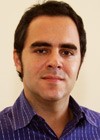
During his year as the José Siderman-Fulbright Human Rights Fellow, Ramos worked as an advisor to the Human Rights Bureau of the Ministry of Foreign Affairs in Argentina, where he defended claims against the State in the criminal justice area. He also has served as Argentina's Undersecretary of Prison Affairs, overseeing more than 30 prisons and jails and leading efforts to eliminate overcrowding. Prior to assuming that post, he worked extensively on reform of the police in province of Buenos Aires.
"If it wasn't for the Siderman Fellowship, it would have been impossible for me to experience something like this. The legal system in the United States is completely different from the system in Argentina, where we don't have Rules of Evidence or jury trials. Everything I learned is extremely valuable and interesting."
During his stay at Southwestern, in addition to studies that focused on the criminal justice process, Federico undertook an independent study project that led to publication in the Southwestern Journal of International Law of an article on the procedural difficulties confronting the Inter-American Commission on Human Rights, and during his final months in Los Angeles he had the opportunity to focus on inmates' rights working for the ACLU.
From August 2011 until July 2014 he served as the Chief Legal Counsel for Argentina's National Immigration Service, which then led him to work as an Associate at Arslanian & Asociados. During 2014 he finished a Postgraduate course on Money Laundering and Terrorism Finance and has been teaching criminal law as a regular professor at the University of Buenos Aires since 2004.
- Florencia Plazas and Luciano Hazan (2009-2010)
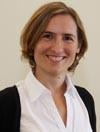
Florencia Plazas is a Lawyer (University of Buenos Aires, UBA) with a major in criminal law. She worked as a lawyer at the Center of Legal and Social Studies, a non-governmental organization founded in 1979 to foster and protect human rights and strengthen the democratic system and rule of law in Argentina. She used to handle many cases in the inter-American system and at the United Nations procedures with the purpose of enhancing the enforcement of human rights in Argentina. There she handled cases in the fight against impunity consisting of seeking judicial penalties for human rights violators during the last dictatorship.
Later, she coordinated the Judicial Academy of the Supreme Court in the province of Buenos Aires. The Academy works on the promotion, orientation, and continuing education and training of judges and court employees. She also developed recommendations about the operation and study of the Supreme Court and other tribunals.
During the last 7 years she worked at the Institutional Policies Department of the Public Defender Main Office. She was in charge of the institutional relations with parliament commissions in the deliberative process of bills dealing with public defense. She also worked on criminal justice reform representing the Public Defender Main Office in a Commission at the Justice Ministry.
During 2015, after a public competitive examination and a public hearing in the national Senate she was appointed as a Federal Public Defender. She works bringing legal aid in federal criminal cases and also gives legal representation to ensure economical, social and cultural rights to those who cannot afford a private lawyer.
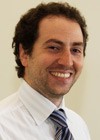 Argentine attorney and legal educator Luciano Hazan, the first Siderman Fellow, has devoted his career to human rights. Since 2003, he has acted as the coordinator of the legal team of the Grandmothers of the Plaza de Mayo, leading its successful efforts to track down the children of persons made to "disappear" by the Argentine military government, which falsified the identities of the children of the disappeared and placed them in adoption. He has also acted as a lawyer for Memoria Activa, an association that seeks justice for the families of victims of the 1994 terrorist bombing of the Jewish Mutual Association (AMIA) in Buenos Aires. While attending law school at the University of Buenos Aires, he was a journalist, writing for Diario Judicial, a newspaper specializing in criminal justice. Luciano also has served as legal counsel to the Human Rights Commission of Argentina's House of Representatives and is a member of the law faculty at the University of Buenos Aires, where he teaches Criminal Law.
Argentine attorney and legal educator Luciano Hazan, the first Siderman Fellow, has devoted his career to human rights. Since 2003, he has acted as the coordinator of the legal team of the Grandmothers of the Plaza de Mayo, leading its successful efforts to track down the children of persons made to "disappear" by the Argentine military government, which falsified the identities of the children of the disappeared and placed them in adoption. He has also acted as a lawyer for Memoria Activa, an association that seeks justice for the families of victims of the 1994 terrorist bombing of the Jewish Mutual Association (AMIA) in Buenos Aires. While attending law school at the University of Buenos Aires, he was a journalist, writing for Diario Judicial, a newspaper specializing in criminal justice. Luciano also has served as legal counsel to the Human Rights Commission of Argentina's House of Representatives and is a member of the law faculty at the University of Buenos Aires, where he teaches Criminal Law."There is a very interesting movement to change criminal justice in all of Latin America, and I would like to learn all I can about criminal justice. That is why I am so thankful to Southwestern, the Siderman family and the Fulbright Commission for this great opportunity."
During his Siderman Fellowship, Luciano focused on Evidence, Criminal Law, Constitutional Law, and Constitutional Criminal Procedure, as well as working at the ACLU. In November 2011, he was chosen by the State Parties to the International Convention on Enforced Disappearances to serve on the Committee on Enforced Disappearances, which monitors compliance with the Convention, and was elected by the Committee to serve as its first Rapporteur.